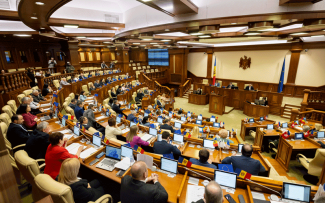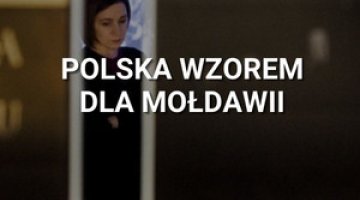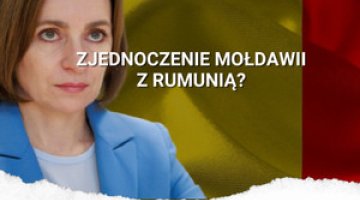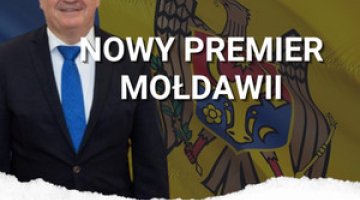On the eve of a parliamentary election in Moldova: a European future in the shadow of uncertain results

On 28 September, a parliamentary election will be held in Moldova, in which the pro-Western Party of Action and Solidarity (PAS) will struggle to retain power. However, polls indicate that although it still enjoys the greatest support among voters, it will be very difficult for the party to replicate its success of four years ago and secure enough backing to govern alone.
In order to remain in power, PAS may be forced to form a coalition with one or more parties that manage to secure seats in the next parliament. Available studies indicate that only openly pro-Russian parties or those that are nominally pro-European but in reality linked to pro-Russian or oligarchic groups, are likely to enter parliament. Cooperation with them could paralyse the reform process and, consequently, slow down or even freeze accession negotiations with the EU. An extremely negative scenario cannot be ruled out, in which PAS is excluded from the governing coalition, formed instead by Eurosceptic and pro-Russian forces.
Sources of PAS’s troubles are both internal…
PAS continues to enjoy the greatest level of public trust. Founded in 2016 on the basis of civic movements at the initiative of President Maia Sandu, the party is a unique entity in the Moldovan political scene. Unlike most other parties – including those nominally pro-European – it has no ties to the oligarchic system that operated in the country from the late 1990s until 2019.[1] It is therefore not focused on defending the interests of political-business groups (other political forces were often – formally or informally – led by figures from these milieus), but is genuinely committed to a profound restructuring of the state and to implementing reforms ultimately aimed at enabling Moldova to join the EU.
PAS is responsible for significant progress on the country’s path towards European integration, including the launch of accession talks in 2024. Over the past year, the government has nearly completed the screening process – a key stage of the negotiations involving a review of national legislation for its compliance with EU law – and has met the conditions set by Brussels to open the first negotiation cluster (the so-called fundamentals).[2]
In the parliamentary election held in July 2021, the party achieved an unprecedented level of support for a pro-European formation (including votes from abroad, where over 14% of all eligible voters cast their ballots), securing as much as 52.8% of the vote. However, in recent years its popularity has clearly declined. It can now count on only approximately 35% support among voters determined to take part in the election.[3] This negative trend for the ruling camp stems from the country’s poor economic situation, the much slower pace of implementing key reforms and de-oligarchisation than expected, communication missteps and scandals involving PAS members, as well as actions targeted against them (mainly propaganda) by Russia and Moldovan political forces representing Russian interests.
The government’s image has been particularly shaken by a marked rise in the cost of living, driven primarily by external factors (Russia’s invasion of Ukraine, the resulting surge in energy prices, investor discouragement, etc.). Improving citizens’ financial situation – alongside the fight against corruption – was one of PAS’s key campaign promises. Since PAS took power, gas prices for individual consumers have almost quadrupled – from 4.5 to 16.74 lei (approximately €0.85) per cubic metre – while electricity prices have doubled. This has led to an inflation rate of 67%. Consequently, the absolute poverty rate in 2024 reached 33.6% – an increase of 6.6 percentage points compared with 2021. The country’s overall economic indicators have fared no better. In 2022, the economy contracted by 5.9%, and in the following two years it stagnated, with GDP growing by just 0.7% and 0.1% respectively. Data for the first quarter of 2025 indicate that the country has entered another recession, with GDP shrinking by 1.2%.[4]
A significant portion of the electorate also believes the authorities have problems implementing judicial reform – one of PAS’s flagship pledges during the 2021 campaign. As many as 44% of citizens rate progress in this area very poorly.[5] This perception stems both from the slow pace of change – particularly in vetting judges and prosecutors – and from scandals accompanying the process. A notable example is the high-profile conflict, ongoing since 2023, between the president and Veronica Dragalin, the head of the anti-corruption prosecutor’s office (2023 and 2025), who had become one of the icons of the judicial reform effort. The president accused Dragalin of inefficiency, while the (now former) prosecutor publicly alleged that the president had attempted to exert direct control over the vetting process.[6]
The slow pace of dismantling the oligarchic system has also negatively affected the government’s image. The first major success in this area came only on 5 August 2025, when Evghenia Guțul – the başkan (head of the executive authority) of the Gagauz Autonomy and a close aide of Ilan Șor, a businessman pursuing the Kremlin’s interests (see below), who fled the country in 2019 and is now hiding in Moscow – was sentenced to seven years in prison. She was found, among other things, to have been involved in the illegal financing of the ȘOR Party, which was controlled by the business mogul and outlawed in June 2023.[7] Another success came with the arrest in Greece on 22 July 2025 of Vlad Plahotniuc, an oligarch who fled the country in 2019 and was placed on Interpol’s wanted list at the request of the Moldovan authorities.[8]
Since coming to power, PAS has also faced the problem of ineffective communication with the public. According to a survey conducted in April 2025, as many as 69% of Moldovans believe the government ‘communicates unclearly’. The same proportion say that its representatives ‘lie’ or ‘are not telling the truth’.[9] It is worth noting in this context that the party has consistently limited the political space for other pro-European formations, as it regarded them as competitors. PAS aimed to monopolise the pro-Western segment of the electorate by presenting itself as the only force capable of effectively implementing the EU integration agenda. It assumed that even if public satisfaction with the government declined, in the absence of a real alternative, voters favouring closer ties with Europe would continue to support it. Consequently, however, it has weakened the prospects for building potential coalitions and, at the same time, created conditions for the rise of centrist parties such as the National Alternative Movement (MAN).
…and external
Moscow is also contributing to the decline in support for PAS. Through popular media – especially social media – the Kremlin is attempting to convince Moldovans that Sandu and her party are deliberately, and at the behest of the West (primarily the United States), destroying relations with Russia. By supporting Ukraine and modernising the armed forces, they are allegedly violating the country’s constitutional neutrality. In Moscow’s view, these steps threaten to destabilise the situation and could even trigger a renewed outbreak of the conflict in Transnistria, which has been frozen since 1992. Effectively, this could drag Chișinău into a war with the Russian Federation, which has 1,500 troops stationed in the separatist region.
As the election date approaches, Russia is intensifying its actions against Moldova. On social media platforms such as TikTok and Telegram, content aimed at ridiculing and discrediting the authorities apppears regularly. Increasingly sophisticated manipulation techniques are being used for this purpose, including AI-generated deepfakes and fabricated articles supposedly written by Western columnists, published on websites mimicking legitimate outlets. One example is a piece that appeared in late July and early August 2025 on a site resembling a popular American gossip website. Allegedly authored by a real journalist working there, the article claimed that President Sandu had illegally acquired the sperm of well-known Western gay celebrities for her supposed partner.[10]
Moscow is also making use of Transnistria, which remains under its political patronage. The self-proclaimed authorities of the parastate, under Russian control, have for months been calling on the PAS government to open at least 42 polling stations there for holders of Moldovan passports, whose number is estimated at approximately 300,000 (while around 2.4 million people live on the territory controlled by Chișinău).[11] The aim is to boost the number of votes cast for pro-Russian parties, which the local population overwhelmingly supports. Ultimately, Moldova’s government decided to open only 12 such polling stations.[12]
The main contenders…
Moldova’s second most popular political force is the pro-Russian Patriotic Electoral Bloc (BEP), which, according to polls, can count on around 25–30% support. Formed in late July and early August 2025, it consists of four components, with the Party of Socialists of the Republic of Moldova (PSRM) – the country’s largest pro-Kremlin party – at its helm. The PSRM, headed by former president Igor Dodon, is part of the Bloc of Communists and Socialists, which currently holds 29 seats in the 101-member parliament. Alongside the Communists led by Vladimir Voronin, who served as Moldova’s president from 2001 to 2009, other parties making up BEP are the Heart of Moldova Republican Party (PRIM), headed by Irina Vlah – the former başkan of the traditionally strongly pro-Russian Gagauz Autonomy in the south – and the Future of Moldova Party, established by former prime minister Vasile Tarlev.
Politically backed by the Kremlin, BEP advocates closer cooperation with Moscow and opposes European integration. It criticises EU-promoted values as allegedly incompatible with Moldovan ones and even openly hostile to Orthodox tradition, which the bloc views as the cultural core of the state. BEP also calls on Chișinău to maintain neutrality and refrain from involvement in the Russian-Ukrainian conflict, although it does not formally support the aggression.
The third political force – with around 10% support – is the nominally pro-European ‘Alternative’ Political Bloc, established in January 2025. It consists of three parties: the aforementioned National Alternative Movement (MAN), led by Chișinău mayor Ion Ceban; the Party of Development and Consolidation of Moldova (PDCM), founded by former prime minister Ion Chicu; and the left-wing Civic Congress (CC). Among the key members and public figures of this alliance is Alexandr Stoianoglo, former Prosecutor General (appointed by Dodon in 2019), who was removed from office at PAS’s initiative following the launch of anti-corruption proceedings against him.
‘Alternative’ is nominally in favour of Moldova’s European integration but has ties to Moscow and receives political support from the Kremlin. Leading politicians within the bloc have in the past openly expressed pro-Russian views and maintained, in some cases intensively, relations with the Kremlin. For many years, Ceban was a member of the Communist Party and later of the PSRM, where he served as its chief ideologue and then as an adviser to President Dodon. In 2019, he was elected mayor of Chișinău as the Socialist candidate (during the campaign, he likely benefited from the support of Russian ‘political technologists’).[13] Mark Tkaciuk, co-founder of the CC, was for many years one of President Voronin’s closest aides and chief ideologue of the Communist Party under his leadership. Meanwhile, Stoianoglo – ultimately cleared of the charges against him – ran in the 2024 presidential election with the backing of the pro-Russian PSRM, positioning himself as the main challenger to incumbent President Sandu. He lost to her in the runoff, receiving 44.65% of the vote.
Despite their professed pro-European stance, the parties comprising the bloc promote many ideas that align with the Russian political narrative or contradict values upheld by the EU. They firmly support maintaining Moldova’s neutrality (both in military terms and, for instance, regarding the ongoing armed conflict in Ukraine) and oppose increasing defence spending. Ceban, for example, has consistently and unequivocally rejected the organisation of pride parades in the capital, portraying them as manifestations of so-called ‘homosexual propaganda’, which he claims ‘should be banned’.[14]
Another political force stands a chance of crossing the electoral threshold – the populist Our Party, currently polling at 9–11%. The party is difficult to classify ideologically, but politically it tends to align more closely with the pro-Russian camp. The party’s leader, Renato Usatîi, presents himself as an anti-establishment figure critical of both PAS and the main opposition forces, with which he is in open conflict. In terms of foreign policy, he identifies as a ‘pro-Moldovan’ activist, advocating independence from both the West (he is sceptical of closer ties with Europe) and Russia. Nonetheless, he has long-standing ties with Russia and holds Russian citizenship, which – according to his own account – was granted to him by Putin under a special decree issued ‘in gratitude for his work and contributions’.[15] Local experts and journalists have repeatedly accused Usatîi of ties to Russian intelligence services. His rhetoric of non-alignment and maintaining an ‘equal distance’ from the main international actors effectively aligns with the Kremlin’s expectations. At the same time, since 2020, Usatîi has been the subject of criminal proceedings in Russia over the alleged embezzlement of 175 billion roubles, and in 2024 a court issued a warrant for his arrest in connection with the case. This can be interpreted both as evidence of the politician’s independence from Moscow and as a means of giving him a veneer of autonomy deliberately crafted by the Russian authorities.
…and the big absentee
The openly pro-Russian ‘Victory’ bloc, comprising four parties under the supervision of Ilan Șor, was ultimately barred from participating in the elections. On 19 July, the Central Electoral Commission refused to register the bloc, stating, among other things, that the parties making up the alliance were effectively successors to the ȘOR Party, which had been declared unconstitutional in June 2023.[16] Consequently, the bloc’s support – estimated by polls at around 10% – shifted towards the Patriotic Electoral Bloc (BEP) and Our Party, or added to the number of undecided voters.
The ban on ‘Victory’ participating in the election stems from actions carried out in recent years by its de facto leader, who is one of the main instruments of Russian influence in Moldova. The most striking example of Ilan Șor’s activity was the large-scale vote-buying operation during the 2024 presidential election and referendum. Using a network of activists and bots, the oligarch mobilised citizens to vote against the president and against European integration. In just the two months leading up to the event, he reportedly spent nearly $40 million on this effort – 20 times the combined campaign costs of all other candidates. He also organised flights to Moldova and to consulates in Minsk, Baku, and Istanbul for Moldovans living in Russia (where only two polling stations were opened, with a combined total of 10,000 ballot papers) to enable them to participate in the vote.[17]
Prospects and risks
A renewed absolute majority for PAS – while seemingly difficult – is not out of the question. Achieving such a result would require strong mobilisation of the diaspora, which could provide the few percentage points needed to bridge the gap. The final decision of undecided voters, who currently make up as much as 20% of the electorate, will also play a crucial role in the outcome.
In the most likely scenario, the current ruling party – despite achieving the best result – will be forced to seek a coalition partner. However, among the parties expected to cross the electoral threshold, there are no obvious allies. Until the end of 2024, the National Alternative Movement (MAN) appeared to be a potential partner. Although President Sandu does not trust Ceban and has repeatedly referred to him as ‘Moscow’s Trojan horse’, she had considered the possibility of cooperating with him. Despite these reservations, his party was the only one with a platform somewhat aligned with PAS that stood a realistic chance of entering parliament.
MAN’s accession to the ‘Alternative’ bloc in January 2025 has radically altered the situation. Although the president has categorically ruled out any coalition with the bloc’s members, the possibility of an alliance should not be entirely dismissed, nor should the option of Ceban informally backing a PAS minority government. Another scenario involves cooperation with an unpredictable partner: Our Party. Given the ideological differences and Usatîi’s openly hostile attitude towards the ruling party, it seems unlikely that the party would enter a formal coalition. However, informal backing for a minority government in exchange for vague concessions cannot be ruled out.
Both a PAS coalition with MAN or Our Party and the formation of a minority government carry serious risks. Any majority formed in this way would be unstable, with cohabitation marked by tensions and conflicts. It is also highly likely that the parties cooperating with Sandu would attempt to push through legislative changes – particularly on social issues and minority rights – that contradict EU law, using the threat of breaking off cooperation as leverage. This could slow accession negotiations and could even lead to the collapse of the government. In such a scenario, a snap election would follow, or a majority government could be formed by opposition parties without PAS – an option that cannot be ruled out.
[1] The nominally pro-European parties that effectively pursued their leaders’ political and business interests included the Liberal Democratic Party of Moldova (PLDM), the Democratic Party of Moldova (PDM) and – albeit to a smaller degree – the Liberal Party (PL), which governed Moldova in various configurations from the end of 2009 until 2019. For more on their modus operandi see K. Całus, ‘A captured state? Moldova’s uncertain prospects for modernisation’, OSW Commentary, no. 168, 22 April 2015, osw.waw.pl.
[2] A declaration confirming the fulfilment of these conditions was made on 4 July during a visit to Chișinău by European Commission President Ursula von der Leyen. Despite this, the opening of the first negotiation cluster is currently impossible due to Hungary’s stance. Budapest opposes taking such a step with regard to Ukraine, which in turn blocks progress for Moldova because the two countries are part of the same so-called package. Chișinău is not seeking decoupling, fearing that such a move could damage its relationship with Kyiv. When Moldova applied for EU candidate status in 2022, Ukraine strongly criticised PAS for allegedly seeking to exploit the tragedy of Russia’s attack on the country to pursue its own political goals. See K. Całus, K. Sienicki, ‘The EU–Moldova summit: pre-election support for pro-European forces’, OSW, 7 July 2025, osw.waw.pl.
[3] It should be noted that the polls do not survey members of the diaspora. However, even taking this into account, the difference between the level of support recorded in July 2021 and in the most recent polls is striking. Four years ago, the party received approximately 47% of the vote nationwide (excluding votes cast abroad) – significantly more than what the most recent polls indicate.
[4] Data after the National Bureau of Statistics of the Republic of Moldova, 16 June 2025, statistica.gov.md.
[5] Barometrul socio-politic, IMAS, April 2025, imas.md.
[6] ‘Președinta Sandu „respinge categoric” acuzațiile Veronicăi Dragalin privind implicarea în vettingul procurorilor’, Radio Europa Liberă Moldova, 11 April 2025, moldova.europalibera.org.
[7] N. Coptu, ‘Evghenia Guțul, condamnată la 7 ani de închisoare cu executare’, Radio Europa Liberă Moldova, 5 August 2025, moldova.europalibera.org.
[8] V. Călugăreanu, ‘Vladimir Plahotniuc a fost reținut în Grecia’, Deutsche Welle, 22 July 2025, dw.com.
[9] Barometrul socio-politic, op. cit.
[10] A. Rusu, ‘O amplă campanie de dezinformare fără scrupule o țintește pe Maia Sandu’, WatchDog.md, 4 August 2025.
[11] Polling stations for residents of Transnistria are located on territory controlled by Chișinău, usually near the so-called administration line – the de facto border between Moldova proper and the separatist ‘republic’.
[12] ‘Президиум Верховного Совета ПМР направил новое обращение по поводу открытия для приднестровцев избирательных участков на парламентских выборах в РМ’, Новости Приднестровья, 27 August 2025, novostipmr.com.
[13] ‘Kremlinovici: Deployment’, RISE Moldova, 7 November 2020, rise.md.
[14] N. Botnaru, ‘Ion Ceban a solicitat interzicerea marșului Pride. Ce spun organizatorii și de ce evenimentul nu este o formă de propagandă’, Diez, 5 May 2025, diez.md.
[15] ‘Renato Usatîi vrea să scape de cetățenia rusă’, NOI, 22 November 2023, noi.md.
[16] ‘Hotărâre cu privire la cererea de înregistrare a Blocului electoral „Victorie-Победа” pentru participare la alegerile parlamentare din 28 septembrie 2025’, Central Electoral Commission, 19 July 2025, a.cec.md.
[17] K. Całus, ‘Moldova: diaspora votes propel Maia Sandu to re-election’, OSW, 4 November 2024, osw.waw.pl.





